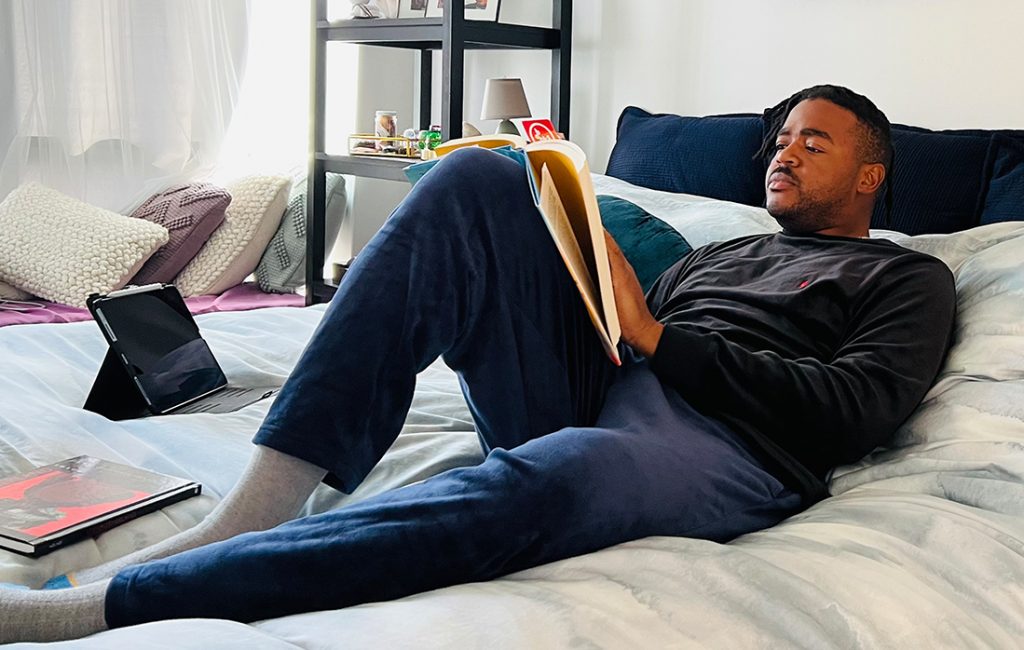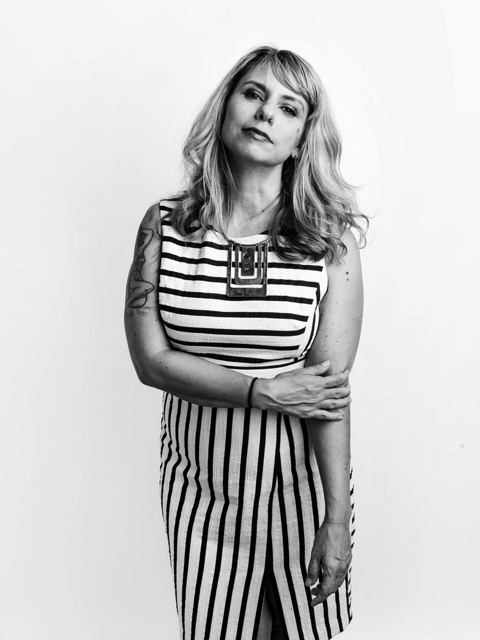 Playwright and poet, Darrel Alejandro Holnes’ work is as fluent with pop culture as it is with social justice. The Afro-Panamanian writer’s debut collection of poems, Stepmotherland, is meditative and hypnotic, lyrically moving through English and Spanish, between the past and the present, the zeitgeist and civil rights.
Playwright and poet, Darrel Alejandro Holnes’ work is as fluent with pop culture as it is with social justice. The Afro-Panamanian writer’s debut collection of poems, Stepmotherland, is meditative and hypnotic, lyrically moving through English and Spanish, between the past and the present, the zeitgeist and civil rights.
His most recent play, Black Feminist Video Game, about a very online Black autistic teen struggling to date is a groundbreaking combination of live action and digital production, produced during the height of the COVID-19 pandemic.
Holnes is the recipient of an NEA grant and the Andrés Montoya Poetry Prize, among other prizes. When he’s not writing poems on the subway, he’s teaching at NYU and CUNY.
He told writer Tricia Romano about how he plays and sleeps.
Morning Routine: 7 A.M. Wake up, read, relax
I usually wake up at 7am. I have my grandfather to blame (or thank) for that. When I left graduate school, and I moved to the city, I had this idea —“If I’m a working man, I need to wake up at either 6:30 or 7 am every day, and make a cup of coffee—even though I hate coffee—read the entire newspaper.” It was so “adult.”
Now, I can’t help it, even if I go to bed at four in the morning, I’ll still wake up at seven. I’ll look at the clock, and then I’ll go back to bed. But it’s my internal clock now.
I usually have tea and listen to soft, instrumental music, open up the drapes, letting as much natural light into the space as possible. I would like to say I start with prayer, but I’m not always that pious; I start with some kind of meditation, a mantra, a thought of the day that I try to hold.
Music in the morning is really important—I like to start the day with good vibrations, and those vibrations are literally in song. I usually try to get some reading done in the morning. I write all my emails the night before, so I don’t have to worry about email in the morning. I try not to check my email until 12, unless I’m expecting news. I give people a chance to respond. That’s a trick I learned when I worked for a nonprofit. It was a distracting open concept office, and when my coworkers left for the day, I loved having space to myself so that I could focus on my work. I’d get so much done for the next day after 5 PM that it would allow me to the flexibility to take it easy in the morning. I don’t like to run through life apurado —which is what we say in Spanish— it means rushed. I don’t like that energy.
Noon, Late Morning Workout and a Productive Commute
I try to do everything in life after 12pm. I’m all about people planning their own schedules. I don’t understand where this fear comes from; people who want things to stay in a traditional 9 to 5 schedule they are afraid to trust people to work at home. I hope that one day corporate culture starts leaning towards providing the workers more agency, flexibility, and support. Across multiple industries, during the pandemic, we’ve all proven people have integrity and have a solid work ethic, even when their work schedules are self-dictated. It’s important to practice self-care, because it provides you with a sense of awareness when you’re at your best. I know that I’m most in my body in the mornings, which is why it’s easiest for me to work out then. And then after that, I’m a little bit more in my head.
In the morning, I usually workout –a combination of cardio, weight lifting, aerobic and anaerobic, yoga, and meditation— before I eat something and before I start checking my email at 12.
It helps to focus my appetite and empower my body to move through the rest of the day. After lunch, I am pretty much just working until maybe six or seven. I’ll just work, work, work, work work, maybe snack a little bit in between until dinner time.
I’m typically on campus at NYU or CUNY for office hours and teaching in person. A lot of faculty meetings and staff meetings are happening on Zoom these days—I have appreciated that shift. Many of my colleagues are always driving in from New Jersey for meetings in NYC, sometimes their commute is over an hour each way just for a meeting *whispers* that could have been an email.
I do my most creative work when I’m in transit. That’s the beautiful thing about being on the New York City subway is that I have an opportunity to focus. I do a lot of poem writing in my notes tab on my phone. It’s a perfect balance of isolation and stimulation. I’m very in tune with what I’m listening to, and when I look up from my phone, I usually find inspiration. The subway is a great place for me to write. It’s always been that way, even before I lived in New York. It’s also where I do a lot of my grading. The subway is a very active workspace for me. It allows me a sense of accomplishment when I’ve walked off the train. My commute is about an hour. I would see it as idle time unless I was being productive.
I mostly write on my phone, but every now and then, I’ll write by hand. Usually, I do that when I read in interviews that other people handwrite. It reminds me that that is a sacred practice.
I’m doing University service on Mondays. And then Tuesday, Thursdays, I’m meeting with my students to work on their various projects. Wednesday, Thursday, I teach. Then on Fridays, I either offer additional office hours or catch up on grading and plan my lessons for the week to come. Everything I do is in service to my students. When I can, I write a stage or screenplay.
Dinner at 7pm
From 6pm to 7pm, I’ll either have dinner or leave for dinner. Pre-pandemic, I’d be out all the time. Go, go, go, go. But nowadays, I’m trying to make decisions that prioritize my health. The sooner I have dinner, the sooner I can have dessert, then the better my body metabolizes it and digests it.
I will enjoy the rest of the evening, and I’ll transition out of work mode around nine so that I can start enjoying time with someone I love or watching a movie or just doing something relaxing. Sometimes video games help; video games are such a mix between art and play they provide a great escape.
Some days, I go back to work, and stop working at around midnight, but I am trying to break myself out of that habit. I was one of those New Yorkers that would fall asleep next to my laptop as I was doing work. We’re socialized to design our lives to be the most productive. For me, a lot of my work ethic comes from that West Indian side of me: To live is to be industrious.
At times, it’s a struggle. I mean, I used to live on adrenaline. I used to produce special events, and much of that work was about thinking on your feet. In those moments, I had to be creative under pressure. That’s what it feels like when I don’t get a lot of sleep. It’s all cortisone and adrenaline.
When I’m in residency I love switching my schedule. I will write very late, till 4 in the morning. Wake up at seven, maybe sleep in or go to breakfast or lunch, and try and do something physical—take a long walk. Sometimes, I’ll take an afternoon nap. I’ve had to work against a sense of guilt with naps. I’m a light sleeper. I haven’t really ever been a napper. But maybe I couldn’t grow into a napper.
I saw something called the Nap Ministry online. When they came about, it was part of a conversation about sleep and self-care being a weapon of social justice. If you don’t take care of yourself, then you can’t take care of the revolution. So, sleep *is* a revolutionary act.
Slowing Down, 9pm
After dinner, I listen to audiobooks. It’s a moment when the rest of the house is quiet. I get to be in another world, which is where the books take me. I’m always a busy body, so I’m always cleaning and clearing up any space I’m in. Lately, I’ve been replacing audiobooks with the nightly world news for a project that I’m working on about corruption, and my dreams are more intense.
Sometimes I’ll catch a feeling and write a poem at night. It’s the moment when I get to be really quiet and listen to myself. Teaching is a giving profession, so I’m typically helping other people accomplish something that they want to do, so I don’t really get to listen to myself very much.
I shower before I go to bed each night. I like to feel clean, the more showers the merrier. Mattress wise? I like a soft to medium mattress. Waking life is hard enough, sleeping life should be much softer.
Resting For Strength, Midnight
For us, around midnight, lights are out, sound goes down, and it’s time to cuddle.
The early days of the pandemic was an opportunity for me to slow down. It was a moment when the term “self-care” really entered the zeitgeist. It’s something that we all started thinking and talking about in March of 2020, especially on social media. And so, for me, self care looks like getting somewhere between six to eight hours of sleep a night. REM sleep, preferably uninterrupted.
Lately, I’ve been thinking about how sleep feeds into my creative process. When I was younger, my creativity was fed by my insomnia. Now, it comes from a place that’s more meditative. And to achieve that level of meditation, I try to get as much sleep as I can; it helps my mind focus.
Look, every day your body is battling illness; your body is battling germs, bacteria, allergies, all of those things, and you are more susceptible to symptoms. Your body will alert you to these threats to your system when it feels like it needs help, and it oftentimes will need that help when you’re not getting enough rest.
My mother worked in the nursing field for decades. And one thing she would always emphasize for us was this idea that rest is a weapon. Just like being a productive artist is very important, if you don’t take care of yourself, then you can’t take care of the revolution.



























